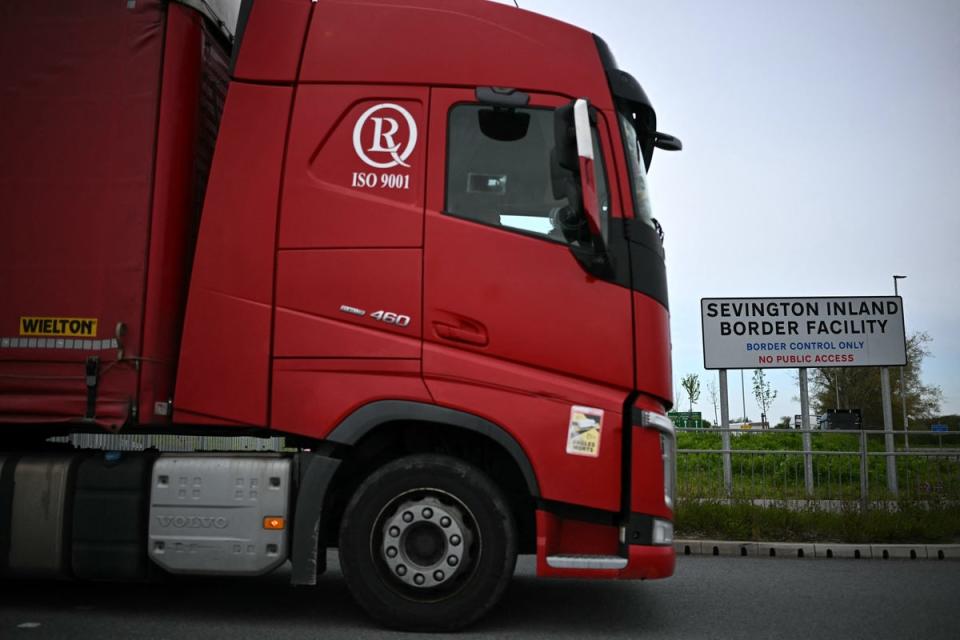New Brexit border checks chaos ‘masked’ by bank holiday weekend as businesses face delays and red tape
The director general of Britain’s leading trade body has described Tory ministers as “smart” for using the bank holiday weekend to mask the impact of a new Brexit border checks system, which is set to add delays, red tape and costs to many imports.
Marco Forgione, director general of the Institute of Export and International Trade (IoE&IT), was commenting on the second phase of the controversial new border target operating model (BTOM) system to check animal and plant exports, which was introduced on Wednesday (30 April).
There have already been reports of garden centres and other businesses “stockpiling” plants and goods to avoid the initial chaos of the system, which was brought in as a result of Brexit.
Mr Forgione told The Independent: “The government was smart to introduce the checks on what is a bank holiday in the EU, as there is a reduction in traffic.
“The point is what will happen in the coming days and weeks. A lot of businesses also completed their movements before the checks came in – inventory management... you might call it stockpiling.”

But he admitted that the BTOM delays are likely to have an impact, especially on small and medium-sized businesses that could struggle to stay afloat as a result of the changes.
This is despite Brexiteers promising that doing business would be easier after leaving the EU and that there would be more opportunities. Remainers always warned that putting up barriers with Britain’s biggest trading partner posed a major risk.
Mr Forgione, who is frequently consulted by business and trade secretary Kemi Badenoch, said: “The biggest question is what happens to the smaller traders and producers, for whom the cost and potential delays are significant. For some businesses, it is pretty much their margin.
“We have had conversations with a number of producers and wholesalers who move products, particularly Polish products [such as] sausages. One haulier estimates the additional cost to them will be £1.5m a year.
“That is either going to result in increasing costs for UK consumers or shrinkflation or availability issues.
“The reality is that the implementation has been, unfortunately, quite poor with regard to engagement with business, making clear what’s happening and when, with enough time and sufficient clarity for businesses to be able to plan.”

The introduction of BTOM is part of the Brexit plan to “take back control” of Britain’s borders. A third phase of the model is due to be introduced in October.
BTOM sets out a new approach to security controls (applying to all imports), and sanitary and phytosanitary controls (applying to imports of live animals, animal products, plants and plant products) at the border. It sets out how controls will be simplified and digitised, and Britain’s ambition for the UK’s new single trade window.
Supporters point out that it makes it easier for importers from non-EU countries, but critics have warned that it is proof that Brexit is adding to the cost of living crisis.
Liberal Democrat Treasury spokesperson Sarah Olney MP said: “This Conservative government is drowning our businesses in red tape and forcing more costs onto the public, who are already enduring a cost of living crisis.
“We need root and branch reform of our relationship with Europe. Businesses and customers cannot be punished because of this Conservative government’s botched deal.
“The Liberal Democrats are the only party who will fix the UK’s broken relationship with Europe and make sure businesses and the public get a fair deal.”
A government spokesperson said: “We are committed to supporting businesses as they adapt to new border checks and maintaining the smooth flow of imported goods. We are working with the horticultural sector to test infrastructure and systems ahead of their introduction.
“We are confident we have sufficient capacity and capability across all points of entry to handle the volume and type of expected checks, while inspectors have undertaken extensive training to ensure goods are treated safely and with care.”


